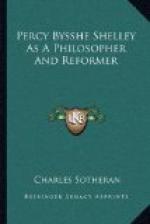“I hated thee, fallen
tyrant! I did groan
To think that a most ambitious
slave,
Like thou, shouldst dance
and revel on the grave
Of Liberty. Thou mightst
have built thy throne
Where it had stood even now;
thou didst prefer
A frail and bloody pomp, which
time has swept
In fragments towards oblivion.
Massacre,
For this I pray’d would
on thy sleep have crept,
Treason and Slavery, Rapine,
Fear and Lust,
And stifled thee, their minister.
I know
Too late, since thou and France
are in the dust,
That virtue owns a more eternal
foe
Than force or fraud; old custom,
legal crime,
And bloody Faith, the foulest
birth of time.”
With full knowledge of all this, he hopefully looked with loving eyes toward this side of the Atlantic, to your magnificent constitution and model Republic, built on the consolidated masonic bases of Liberty, Equality, and Fraternity, as did also the mass of my compatriots, who, suffering under a more intolerant despotism, and unable to help themselves, had no hand or voice in the attempted tyranny, from which your forefathers properly rebelled one hundred years ago.
In “Hellas” we find Shelley advocating the cause of Greece, and it is believed, that that poem assisted his friend Byron in the determination to wield his sword in the cause of Grecian Liberty. “The Revolt of Islam,” his most mystical work, next to his early effort, “St. Irvyne, or the Rosicrucian,” is full of the most majestic and sympathetic thoughts, and underlying its weirdness we have all those elements “which essentially compose a poem in the cause of a liberal and comprehensive morality, and with the view of kindling in the bosom of his readers a virtuous enthusiasm for those doctrines of liberty and justice, that faith and hope in something good, which neither violence, nor misrepresentation, nor prejudice, nor the continual presence and pressure of evil, can ever totally extinguish among mankind.”
Can we wonder that Shelley could be else than Republican when he regarded what Thackeray afterward summed up with biting irony, the record of the reigning house of Great Britain, the mad Guelph Defenders of the Christian Faith(_?_), the results of whose labors have been corroborated by Greville and recent writers?
To what a line of monarchs, was Shelley called upon to give allegiance and prostrate himself before, and can we be astonished that he thus describes the state these abominable Hanoverians had “England in 1819:”
“An old, mad, blind,
despised and dying king,—
Princes
the dregs of their dull race who flow
Through public scorn, mud
from a muddy spring,—
Rulers who
neither see, nor feel, nor know,
But leech-like to their fainting
country cling,
Till they
drop blind in blood without a blow,—
A people starved and stabbed
in unfilled field,—




